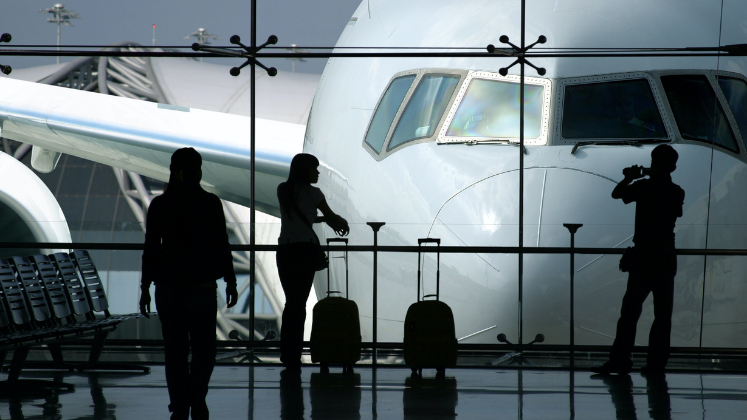For many academics, long distance travel and flying are seen as both necessary and a perk of the profession. However, as concerns around the environmental impact of flying mount, especially the impact of high frequency fliers, there are growing calls to limit academic travel. In this post Agnes Kreil and Sara Ullström discuss their decision not to fly as part of their doctoral research and present three strategies for how PhD students (and other academic researchers) can maintain meaningful research connections remotely.
If you wanted to emit as many greenhouse gases as possible in the shortest amount of time, flying would be one of your absolute best bets – that’s how harmful it is to the climate. Awareness around this fact has spread among climate protesters and sparked a movement dedicated to reducing air travel. It has also seeped into the academic community, where many individual researchers and universities have realised that their carbon footprints are dominated by emissions from business travel.
The trouble is that many researchers see flying as necessary for achieving high-quality research and academic success. The value of international travel is especially emphasised for early career scholars, for whom travel is presented as being essential to research and career development. Trying to reduce these emissions can thus feel daunting – especially considering that carbon offsetting and technological innovation aren’t going to solve the problem on their own. We are actually going to have to fly less, and this can seem like a threat to our careers.
these reflections can serve as a concrete starting point for thinking about what a low-carbon academic system could look like
We understand this dilemma because we have been there. Both authors of this post are doing, or have done, doctoral projects directly related to the climate impact of air travel. Daily confrontation with that problem has led us to choose not to fly for our doctorates. We have therefore had to think strategically about how to build our networks and achieve impact in a grounded way instead.
Several years (and one pandemic) down the line, we think we’re doing okay. Reflecting upon our own experiences, we have three recommendations for effective online networking that have been helpful for us in organizing our doctorate projects flight-free. We share these not because we think individual consumption choices are the way to solve climate change, but because we see a prefigurative role for personal change in the context of structural and societal transformation: In other words, these reflections can serve as a concrete starting point for thinking about what a low-carbon academic system could look like, including how academic work can be transferred more online.
Virtual world, real people
Virtual interaction via text or video is unintuitive for many, leading some to conclude that it isn’t possible to build new durable relationships online. But we find that virtual networking becomes more navigable when we remember that the person on the other side of the screen still has the same wishes, needs, dislikes, and biases they would have anywhere. You can’t always do online what you would intuitively do offline, but you can notice those intuitions and transfer them to the online world.
You can’t always do online what you would intuitively do offline, but you can notice those intuitions and transfer them to the online world.
For us, this means avoiding the transactional nature of online engagement and trying to self-consciously use online tools to connect in more humane ways. For example, sending a nice message when we ‘run into’ an acquaintance at a webinar, and sticking around afterward for a chat if possible. It means inviting interesting people to video calls and remembering to catch up some months later – and not being afraid to ‘waste’ some meeting time getting side-tracked. It also extends to using social media to congratulate colleagues on their successes, share their queries, answer their questions, and ‘like’ their jokes so they know you smiled.
Curate your online presence
The internet provides amazing opportunities for people all around the world to find each other. Make yourself accessible by being visible online – both for researchers and other actors like journalists. Look actively for the conversations that interest you and engage in them, so that people you want to connect with know who you are – even before you contact them directly. Also carefully set up your profiles and update them regularly to reflect your current interests. Think how many times you have come across a dead email or researcher profile and subsequently not made contact; then don’t be that person. Just as you would present yourself at a conference, you want your online presence to come across as both serious and approachable.
You can also take advantage of the added (and fun!) benefits of social media, which can make being visible and getting in touch even easier. For example, we both pin tweets relating to our research to show what we are currently working on and spark the interest of profile visitors. Agnes also uses emojis behind her name on twitter ✈️🌡🌍 to symbolize her research topic, so anyone who sees a single tweet by her and is interested in the topic immediately knows they want to follow her.
Get your community online
Aside from our being located in Europe, which allowed us to travel to some conferences and research stays on the ground, the reason we were able to organize our doctoral projects flight-free is because our academic community, which researches flying through a climate lens, shares our discomfort around business air travel. Most colleagues are thus very willing to meet online instead. Plenty of webinars and virtual gatherings provide vital opportunities for networking and collaborations. Without these, organizing our projects in flight-free ways would likely have been more difficult.
As the pandemic has stopped much academic travel during the last two years, now is a good time to establish new cultures for research collaborations online. While decarbonizing networking and collaboration is a community effort, the good news is it doesn’t necessarily take a university or even a whole discipline to transition. Your choices, and the events you organize, can do a lot to influence the norms governing how researchers in your specific field meet and interact.
As the pandemic has stopped much academic travel during the last two years, now is a good time to establish new cultures for research collaborations online.
Agnes took this to heart by co-organizing a webinar on an open question she was having, which opened interesting discussions, boosted her visibility, and gave her an opportunity to connect with collaborators. Together, we regularly do group calls with other PhD students in our field, which has provided an important sense of collegiality with others working on the same issues – something that might be hard to find at a research department or even a university.
What we have offered here is just a few of the things you can do to effectively network online. Of course, these individual strategies need to be complemented by structural interventions for example from universities. But, individual researchers can develop a toolbox of possibilities and find solutions for the problems they encounter, so that everyone can use them. By showing that virtual networking is possible, we can inspire others to support structural change.
In many ways we are still at the beginning of a conversation about reducing academic flying. So we would like to know, what are your favourite strategies for online networking? Please share them in the comments below!
The content generated on this blog is for information purposes only. This Article gives the views and opinions of the authors and does not reflect the views and opinions of the Impact of Social Science blog (the blog), nor of the London School of Economics and Political Science. Please review our comments policy if you have any concerns on posting a comment below.
Image Credit: yousef alfuhigi via Unsplash.









1 Comments